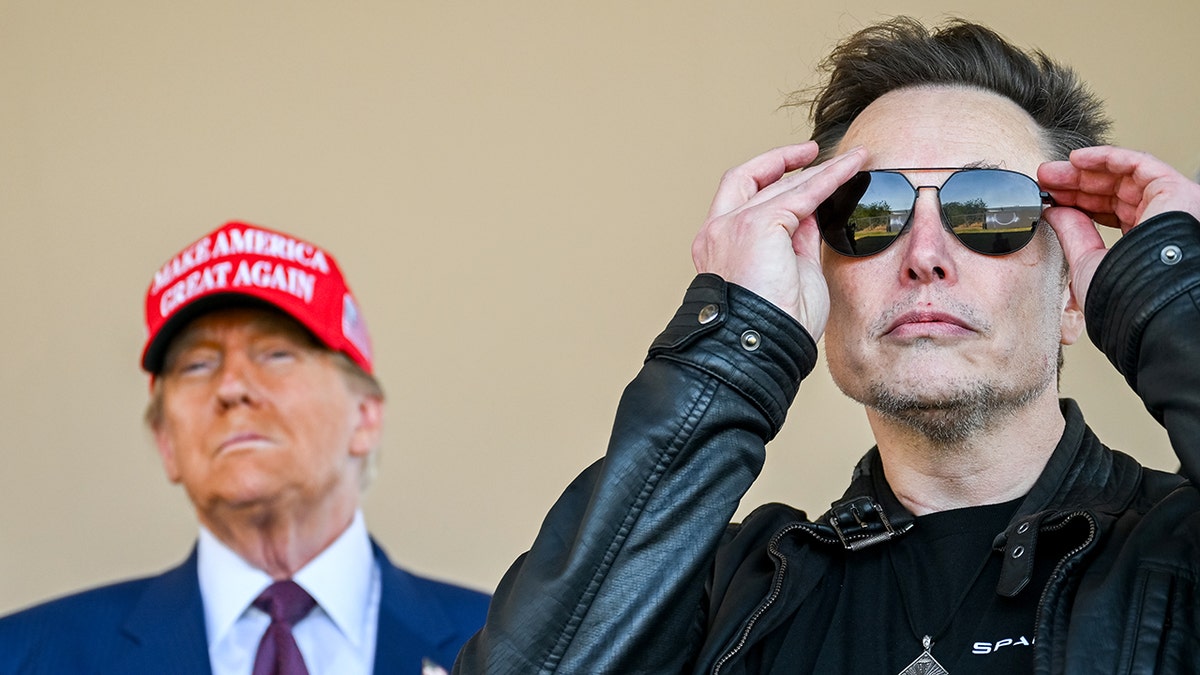
Trump’s proposal cuts SpaceX competitors out of NASA’s
budget and could add billions to Musk’s defense contracts
Musk Set to Win Big with Trump’s
Trillion-dollar Pentagon Budget
Nick Turse / The Intercept
(May 7, 2025) — The White House unveiled a barebones budget blueprint last week that would pump more of the federal budget into the Pentagon while taking a chainsaw to education, foreign aid, health care and public assistance programs.
While some analysts claim that the outline, also known as a “skinny budget,” represents a modest cut to Pentagon spending, that fails to take into account the White House’s call for $119 billion in defense spending to be included in a reconciliation bill currently being debated in Congress. With that added to the base budget proposal, which keeps the Pentagon budget at roughly the same $893 billion level as last year, total defense spending would increase by 13 percent to $1 trillion.
Elon Musk, the world’s richest man and a personal adviser to the president, claimed that he would cut costs at the Pentagon with his minions at the so-called Department of Government Efficiency.
Instead, experts say that, if approved, Donald Trump’s bloated Pentagon budget will almost certainly benefit Musk and his company SpaceX with huge new projects.
The first is a missile shield, dubbed the Golden Dome, which is reminiscent of the Reagan-era “Star Wars” missile-defense boondoggle. Trump’s budget plan also calls for an undisclosed flood of funding for “U.S. space dominance to strengthen U.S. national security.”

“No matter how you slice it, the Pentagon budget is obscenely high at a time when the fundamentals of our diplomatic infrastructure are being decimated, the social safety net is being shredded, and medical and scientific research are under attack,” William Hartung, a senior research fellow at the Quincy Institute for Responsible Statecraft, told The Intercept.
“Add to this that the funds for the Pentagon have as much to do with pork barrel politics and techno-fantasies like the Golden Dome as they do with a sound defense strategy, and it becomes clear that current resources going to the Pentagon are not only excessive but are more likely to undermine than promote our security.”
Trump’s Golden Dome appears to be little more than a warmed-over version of the 1980s Strategic Defense Initiative, a fanciful project that hoped to shoot down Soviet intercontinental ballistic missiles, or ICBMs, retitled with a name swiped from Israel’s Iron Dome anti-missile defense. Its ultimate price tag is estimated in the hundreds of billions or even trillions of dollars.
Musk’s SpaceX has emerged as a front-runner to win crucial parts of the Golden Dome project, which aims to build a network of satellites to detect and track missiles streaking toward the United States. SpaceX not only manufactures rockets that can launch military payloads into space, but also satellites that can provide surveillance and targeting technology. The firm is already the top Pentagon supplier of launch services and low-Earth-orbit communications systems.

Unlike Israel’s Iron Dome, which defends that tiny country against short-range threats, America’s Golden Dome would need to cover a much larger area against a more challenging range of weapons, including ICBMs and hypersonic missiles. Even if blanketing the United States with these defenses were economically feasible, the technology isn’t.
“The Golden Dome is basically a fantasy,” said Gabe Murphy, a policy analyst at Taxpayers for Common Sense, a nonpartisan budget watchdog advocating for an end to wasteful spending. Israel’s system needs to defend just 8,500 square miles, while the U.S. system needs to cover 3.8 million. “Physicists say that this technology to defend against ICBMs and hypersonic missiles doesn’t exist. Funneling tens, perhaps hundreds, of billions of dollars into technology with only a faint hope of success is extremely wasteful.”
SpaceX has proposed providing its Golden Dome technology to the Defense Department through a “subscription service,” according to reporting by Reuters. Pentagon officials and experts have expressed concerns about this unusual model for a critical defense program, which runs the risk of leading to cost overruns and a lack of oversight and control over the program.
“Building 600 to 1,200 satellites
doesn’t mean you can actually defend the US against ICBMs and hypersonic missiles.”
“With his subscription model plan, Musk is looking to both retain control of these systems and keep taxpayer dollars flowing his way,” said Murphy. “But just like a blue check mark doesn’t make you famous, building 600 to 1,200 satellites doesn’t mean you can actually defend the United States against ICBMs and hypersonic missiles.”
A group of 42 Democratic lawmakers has already called for a review by the Pentagon’s acting inspector general of Musk’s role in the bidding process for the missile defense shield.
“Mr. Musk, in addition to his role at SpaceX, is a Special Government Employee (SGE), Senior Advisor to President Trump, and a key official at the Department of Government Efficiency (DOGE),” the lawmakers wrote. “Mr. Musk’s formal or informal participation in any process to award a government contract raises serious conflict of interest concerns, including the possibility that SpaceX is a top contender for the Golden Dome contract because of Mr. Musk’s position in the government.”
If the inspector general launches an inquiry and finds Musk provided an advantage to SpaceX in the bidding process, the lawmakers requested the findings be referred to the Justice Department for a criminal investigation.
SpaceX broke into major defense contracting through the courts.
In 2014, the company sued the Air Force after it awarded a sole-source contract for rocket launches to a Boeing–Lockheed Martin joint venture called United Launch Alliance, arguing that opening the contract up to competition could save the government hundreds of millions of dollars per launch. SpaceX prevailed, and now has, according to many observers, a near-monopoly on the U.S. satellite launch market.
SpaceX’s chief operating officer Gwynne Shotwell said the company has about $22 billion in government contracts, mostly from NASA. But SpaceX’s deals with the Pentagon have ballooned — totaling almost $8 billion — as it has provided an increasing number of services to the Defense Department.
NASA is slated for a budget cut under Trump’s plan, but SpaceX is still likely to win big. Trump’s budget blueprint takes aim at the old guard of the military–industrial complex, including the rivals SpaceX displaced to gain its foothold at the Pentagon. Trump is calling for NASA to end funding for the Space Launch System, a massive Boeing and Northrop Grumman rocket, and Lockheed Martin’s Orion astronaut capsule, which was to be employed to take the U.S. back to the moon.
SpaceX recently won an $843 million contract to “de-orbit” the International Space Station when it is retired in 2030. Musk urged Trump to speed up its demise and focus on his own pet project, posting on his own website, X.com: “Let’s go to Mars.”
To that end, Trump’s cancellation of key parts of NASA’s lunar program allows for a Mars-focused agenda. His budget blueprint also calls for $1 billion in new spending to specifically focus on a mission to the red planet.

DOGE’s Pentagon Budget Cuts
Don’t Touch Elon Musk’s SpaceX
Trump’s indulgence of Musk’s Martian fantasies with U.S. tax dollars, Musk’s billions in contracts with NASA and the Pentagon, and the additional billions his company stands to reap from Trump’s fantastical Golden Dome project all raise profound pay-to-play issues.
These new contracts and budget priorities are “all coming to a man who spent close to $290 million getting Trump and other Republicans elected. This is an unelected billionaire who is taking a sledgehammer to essential programs for diplomacy and basic support for Americans in need,” Hartung told The Intercept. “The conflict of interest is jaw-dropping, and his power — and how he is wielding it — is obscene.”